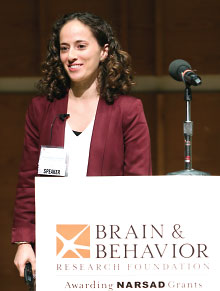The Brain and Behavior Research Foundation’s (BBRF) 2018 International Mental Health Research Symposium celebrated scientists who have traveled far and wide over their careers at a research symposium in New York last month.
Lebanese immigrant Anissa Abi-Dargham, M.D., the Lourie Endowed Chair in Psychiatry at New York’s Stony Brook University, received the Lieber Prize for Outstanding Research in Schizophrenia. She was recognized for her work demonstrating that people with schizophrenia have excess dopamine in the striatum (a part of the brain’s reward network). Previously, it had been believed that schizophrenia was associated with reduced dopamine throughout the brain.
Later that day, Lakshi Yatham, M.D., M.B.A., whose career has taken him from India to England and now Vancouver, Canada, was awarded the Colvin Prize for Outstanding Research in Mood Disorders. He was recognized for his work demonstrating the benefits of early intervention in individuals with bipolar disorder, particularly in the area of weight gain, which can begin after a first episode of mania.
The overarching message of the symposium, said President of the BBRF Scientific Council (and former APA President) Herbert Pardes, M.D., was that “great science knows no boundaries.” However, while research knows no boundaries, its application does: barriers still prevent many people from obtaining appropriate care and benefiting from research advances. APA President Altha Stewart, M.D., a special guest at this year’s symposium—drove home this message.
“Everyone should have a fair and just opportunity to be healthy,” said Stewart, who is the chief of social and community psychiatry and director of the Center for Health in Justice-Involved Youth at the University of Tennessee Health Science Center (UTHSC) in Memphis.
Unfortunately, when it comes to good health, the playing field is not fair and just, Stewart told the audience. Many communities, particularly low-income and disadvantaged minority communities, have the deck stacked against them—a lack of quality health services like mental health centers, inability to pay for the care that is available, and institutional racism that limits their voice when it comes to policy decisions.
Stewart acknowledged that trying to eliminate these health inequities can feel overwhelming as they are driven by systemic problems. But academic health centers, which are often located in or near communities that need support, are in a strong position to help. Researchers should also collaborate with mental health advocates outside the scientific arena—people like Judge Steven Leifman, who was
honored with BBRF’s 2018 Pardes Humanitarian Prize in Mental Health.
Finally, researchers should not be afraid to try new and innovative solutions to tackle longstanding mental health problems. Some of that innovation was on hand for the last part of the symposium, as two early career investigators recently awarded BBRF Young Investigator Grants discussed their future goals.
For both presenters at the session—Michelle Pelcovitz, Ph.D., and Sam Emaminejad, Ph.D.—the theme was wearable technologies. Pelcovitz, an assistant professor of psychology and psychiatry at Weill Cornell Medicine, is conducting a pilot study testing virtual reality (VR) headsets as a means of delivering therapy for social anxiety disorder to adolescents. She said that VR might be especially useful for youth since studies have shown they are less likely to respond to in-person cognitive-behavioral therapy (CBT), the preferred therapy for social anxiety.
Pelcovitz hopes that a VR scenario of a social gathering might help adolescents extinguish their social fears in a safe environment. Using VR enables Pelcovitz to easily adjust parameters of the gathering, which can help pinpoint the specific social cues that trigger an anxiety attack.
Emaminejad, an assistant professor of electrical engineering at UCLA, believes that wearable sensing technologies may help provide markers of disease course and management. Specifically, he is interested in biomarkers that may be contained in sweat that provide objective measures of depression severity. The idea came to him after witnessing a friend who developed depression and had immense trouble expressing what he was going through.
Since people don’t sweat on demand, Emaminejad developed a thin wristband that can trigger sweat glands using a tiny electrical current. Once sweat is released, sensors on the band analyze the levels of interleukins, which are inflammation-associated molecules that have been linked with psychiatric disorders. He is conducting a pilot study with patients with depression—some of whom are taking antidepressants and others who are medication free—to determine whether antidepressant use alters cytokine levels. ■


